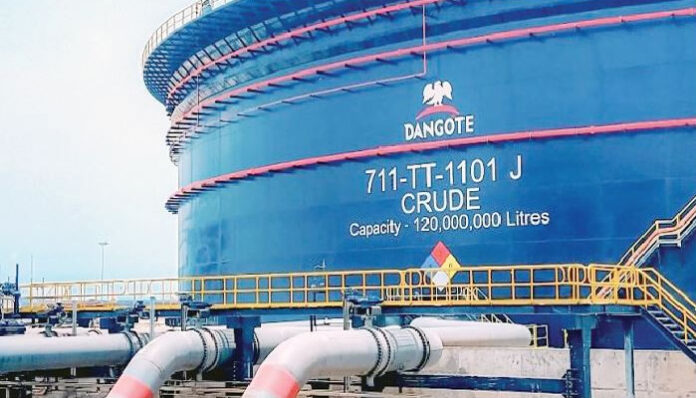•Lifted 148m litres from refinery in 10 weeks
CHIGOZIE AMADI
Major Energies Marketers Association of Nigeria (MEMAN) says its members have of late relied on Dangote refinery for petrol supply, though they have licences to import the product. Chief Executive Officer of MEMAN, Mr. Clement Isong, disclosed this yesterday, during a quarterly webinar organised by the association for energy reporters.
Isong stated that MEMAN members sourced a total of 148 million litres of petrol from the $20 billion Lagos-based Dangote refinery between September 16 and November 24, 2024, averaging two million litres daily over 10 weeks.
Currently, the major marketers, including 11 Plc., Ardova Plc., Conoil, MRS, Nigerian National Petroleum Company Limited (NNPCL), and TotalEnergies, collectively account for between 40 and 50 per cent of Nigeria’s petroleum products market share.
Isong was represented at the discourse by MEMAN’s Head of Economic Intelligence, Research and Regulation, Ogechi Nkwoji.
The MEMAN CEO, who spoke on “Fuel Pricing,” explained that while members of the association had licences to import petrol, they had in recent times relied on local supply from Dangote refinery due to the competitive market framework already in place.
He stated that products lifted from Dangote refinery were transported via trucks and vessels to marketers’ facilities in Lagos, highlighting the operational flexibility within the supply chain.
Providing a detailed breakdown of volumes lifted during the 10 weeks, Isong stated that MEMAN members loaded 29,468,333 litres in Week 38 (September 16–22, 2024), followed by 20,843,322 litres in Week 39, and 27,236,283 litres in Week 40.
He said, “However, volumes began to decline in subsequent weeks, reaching a low of 1,600,000 litres in Week 46.
“The supply slightly rebounded to 11,596,397 litres by Week 47 (November 18–24, 2024).”
Isong revealed that the development stemmed from a federal government directive, issued through the Ministry of Finance, which ended NNPCL’s intermediary role and paved the way for independent petroleum marketers to negotiate and purchase petrol directly from local refineries, fostering competition and efficiency.
He disclosed that the spot price of petrol based on the 30-day pricing trend from October 10 to November 22, 2024, stood at N976.07 per litre. He added that the average price during the same period was N971.14 per litre.
Isong maintained that the product cost per metric tonne was estimated at N708,390, calculated using a foreign exchange rate of N1,665.99 to the dollar.
On factors influencing petrol pricing in Nigeria, Isong explained that critical cost components included the jetty location, such as ASPM, and a standard product quantity benchmarked at 38,000 metric tonnes.
He stated, “The pricing methodology relies on the Argus Gasoline Euro-Bob benchmark for West African deliveries, combined with an average premium.
“The exchange rate is derived from the Central Bank of Nigeria’s (CBN) weighted average rate within the Nigerian Foreign Exchange Market (NFEM), which significantly impacts the final price.”
Isong added that finance charges contributed heavily to the cost structure, pegged at 32 per cent per annum over a 30-day cycle.
He said freight costs for Ship-to-Ship (STS) operations and related charges reflected a 10-day delivery timeframe to the ASPM jetty, Lagos Midstream Jetty (LMJ) located at the Lagos Apapa Harbour.
“Other local charges include those imposed by the Nigerian Ports Authority (NPA) for services, such as towage, berthage, and cargo handling, as well as contributions to NIMASA at two per cent of local freight and regulatory fees from the Nigerian Midstream and Downstream Petroleum Regulatory Authority (NMDPRA), which add a combined one per cent levy,” Isong said.
He stated that the miscellaneous costs were capped at N2.00 per litre, further illustrating the country’s complex fuel pricing dynamics.

























